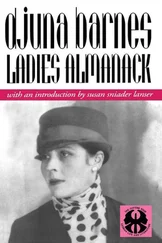‘Ho!’ hooted the doctor, ‘because I’m American I believe anything, so I say beware! In the king’s bed is always found, just before it becomes a museum piece, the droppings of the black sheep’—he raised his glass, ‘To Robin Vote.’ He grinned. ‘She can’t be more than twenty.’
With a roar the steel blind came down over the window of the Café de la Mairie du VIe.
Felix, carrying two volumes on the life of the Bourbons, called the next day at the Hôtel Récamier. Miss Vote was not in. Four afternoons in succession he called, only to be told that she had just left. On the fifth, turning the corner of the rue Bonaparte , he ran into her.
Removed from her setting—the plants that had surrounded her, the melancholy red velvet of the chairs and the curtains, the sound, weak and nocturnal, of the birds-—she yet carried the quality of the ‘way back’ as animals do. She suggested that they should walk together in the gardens of the Luxembourg toward which her steps had been directed when he addressed her. They walked in the bare chilly gardens and Felix was happy. He felt that he could talk to her, tell her anything, though she herself was so silent. He told her he had a post in the Crédit Lyonnais , earning two thousand five hundred francs a week; a master of seven tongues, he was useful to the bank, and, he added, he had a trifle saved up, gained in speculations.
He walked a little short of her. Her movements were slightly headlong and sideways; slow, clumsy and yet graceful, the ample gait of the night-watch. She wore no hat, and her pale head, with its short hair growing flat on the forehead made still narrower by the hanging curls almost on a level with the finely arched eyebrows, gave her the look of cherubs in renaissance theatres; the eye-balls showing slightly rounded in profile, the temples low and square. She was gracious and yet fading, like an old statue in a garden, that symbolizes the weather through which it has endured, and is not so much the work of man as the work of wind and rain and the herd of the seasons, and though formed in man’s image is a figure of doom. Because of this, Felix found her presence painful, and yet a happiness. Thinking of her, visualizing her, was an extreme act of the will; to recall her after she had gone, however, was as easy as the recollection of a sensation of beauty, without its details. When she smiled the smile was only in the mouth, and a little bitter: the face of an incurable yet to be stricken with its malady.
As the days passed they spent many hours in museums, and while this pleased Felix immeasurably, he was surprised that often her taste, turning from an appreciation of the most beautiful, would also include the cheaper and debased, with an emotion as real. When she touched a thing, her hands seemed to take the place of the eye. He thought: ‘She has the touch of the blind who, because they see more with their fingers, forget more in their minds.’ Her fingers would go forward, hesitate, tremble, as if they had found a face in the dark. When her hand finally came to rest, the palm closed, it was as if she had stopped a crying mouth. Her hand lay still and she would turn away. At such moments Felix experienced an unaccountable apprehension. The sensuality in her hands frightened him.
Her clothes were of a period that he could not quite place. She wore feathers of the kind his mother had worn, flattened sharply to the face. Her skirts were moulded to her hips and fell downward and out, wider and longer than those of other women, heavy silks that made her seem newly ancient. One day he learned the secret. Pricing a small tapestry in an antique shop facing the Seine, he saw Robin reflected in a door mirror of a back room, dressed in a heavy brocaded gown which time had stained in places, in others split, yet which was so voluminous that there were yards enough to refashion.
He found that his love for Robin was not in truth a selection; it was as if the weight of his life had amassed one precipitation. He had thought of making a destiny for himself, through laborious and untiring travail. Then with Robin it seemed to stand before him, without effort. When he asked her to marry him it was with such an unplanned eagerness that he was taken aback to find himself accepted as if Robin’s life held no volition for refusal.
He took her first to Vienna. To reassure himself he showed her all the historic buildings. He kept saying to himself that sooner or later, in this garden or that palace, she would suddenly be moved as he was moved. Yet it seemed to him that he too was a sightseer. He tried to explain to her what Vienna had been before the war; what it must have been before he was born; yet his memory was confused and hazy, and he found himself repeating what he had read, for it was what he knew best. With methodic anxiety he took her over the city. He said, ‘You are a Baronin now.’ He spoke to her in German as she ate the heavy Schnitzel and dumplings, clasping her hand about the thick handle of the beer mug. He said: ‘Das Leben ist ewig, darin liegt seine Schönheit.’
They walked before the Imperial Palace in a fine hot sun that fell about the clipped hedges and the statues warm and clear. He went into the Kammergarten with her and talked, and on into the Gloriette , and sat on first one bench, and then another. Brought up short, he realized that he had been hurrying from one to the other as if they were orchestra chairs, as if he himself were trying not to miss anything; now, at the extremity of the garden, he was aware that he had been anxious to see every tree, every statue at a different angle.
In their hotel, she went to the window and pulled aside the heavy velvet hangings, threw down the bolster that Vienna uses against the wind at the ledge, and opened the window, though the night air was cold. He began speaking of Emperor Francis Joseph and of the whereabouts of Charles the First. And as he spoke, Felix laboured under the weight of his own remorseless re-creation of the great, generals and statesmen and emperors. His chest was as heavy as if it were supporting the combined weight of their apparel and their destiny. Looking up after an interminable flow of fact and fancy, he saw Robin sitting with her legs thrust out, her head thrown back against the embossed cushion of the chair, sleeping, one arm fallen over the chair’s side, the hand somehow older and wiser than her body; and looking at her he knew that he was not sufficient to make her what he had hoped; it would require more than his own argument. It would require contact with persons exonerated of their earthly condition by some strong spiritual bias, someone of that old régime, some old lady of the past courts, who only remembered others when trying to think of herself.
On the tenth day, therefore, Felix turned about and re-entered Paris. In the following months he put his faith in the fact that Robin had Christian proclivities, and his hope in the discovery that she was an enigma. He said to himself that possibly she had greatness hidden in the non-committal. He felt that her attention, somehow in spite of him, had already been taken, by something not yet in history. Always she seemed to be listening to the echo of some foray in the blood, that had no known setting; and when he came to know her this was all he could base his intimacy upon. There was something pathetic in the spectacle: Felix reiterating the tragedy of his father. Attired like some haphazard in the mind of a tailor, again in the ambit of his father’s futile attempt to encompass the rhythm of his wife’s stride, Felix, with tightly held monocle, walked beside Robin, talking to her, drawing her attention to this and that, wrecking himself and his peace of mind in an effort to acquaint her with the destiny for which he had chosen her; that she might bear sons who would recognize and honour the past. For without such love, the past as he understood it, would die away from the world. She was not listening and he said in an angry mood, though he said it calmly, ‘I am deceiving you!’ And he wondered what he meant, and why she did not hear.
Читать дальше












